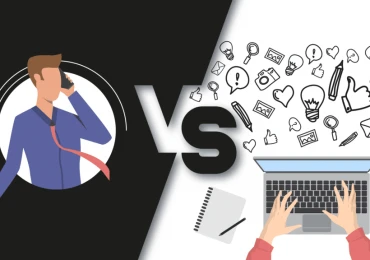
It is a marketing approach that focuses on using new and unconventional ideas and methods to create and deliver value to customers in unique and innovative ways. This type of marketing aims to provide new solutions that meet market needs in an unprecedented way, and often involves the use of technology and innovation to enhance the customer experience.
Characteristics of innovative marketing:
1. Creativity and imagination: It relies on thinking outside the box and developing unconventional marketing ideas.
2. Adapting to changes: It requires the ability to adapt to market changes and modern trends.
3. Focus on technology: It often includes the use of advanced technology to improve marketing processes or user experience.
4. Boldness and risk: It involves trying new ideas and taking high risks to achieve great results.
Benefits of innovative marketing:
1. Brand distinction: It helps distinguish the brand from competitors and attract attention.
2. Improving the customer experience: It offers new ways to improve the customer experience and increase their satisfaction.
3. Increasing loyalty: By offering innovative products or services, a strong and long-term relationship with customers can be built.
4. Taking advantage of market opportunities: It allows companies to discover and exploit new opportunities in the market.
Advantages of innovative marketing:
1. Competitiveness: It gives companies the ability to outperform competitors by offering innovative solutions.
2. Stimulating internal innovation: It encourages companies to innovate within the organization, which is positively reflected in all aspects of the business.
3. Market flexibility: Companies that adopt innovative marketing can quickly adapt to market changes.
4. Enhancing brand loyalty: Innovation in marketing strengthens the relationship between the brand and customers and increases their loyalty.
Disadvantages of innovative marketing:
1. High costs: Developing and implementing innovative ideas can be expensive.
2. Risks of failure: Innovative experiments always carry with them the risk of failure and lack of acceptance by the market.
3. Implementation challenges: Transforming innovative ideas into reality can be complex and requires a lot of time and effort.
4. Uncertainty: Uncertainty about the results of innovative campaigns can be a source of concern for companies.
Modern examples of innovative marketing:
1. Colgate:
Innovation: Smart toothbrush
Details: Launched a toothbrush equipped with technology to track and analyze brushing habits.
2. Garnier:
Innovation: Interactive experience via augmented reality (AR).
Details: An app that allows users to try on cosmetics virtually.
3. Burger King:
Innovation: The “Unforgettable Burger” campaign.
Details: The company used AR technology to promote products.
4. Shopify:
Innovation: Advanced analytics tools for marketers.
Details: Provides tools to help merchants improve marketing strategies using big data.
5. Doritos:
Innovation: The “Wala’ha” campaign.
Details: Used data analytics technology to create personalized ads based on consumer data.
Innovative marketing is a marketing approach that focuses on developing new ideas and methods to create added value and provide unconventional solutions to the market. It is characterized by its ability to improve the customer experience and enhance their loyalty, but it also involves challenges such as high costs and the risk of failure. Innovative marketing can give companies a significant competitive advantage in an ever-changing marketplace.

30/08/2024

18/08/2024

18/08/2024

16/08/2024

26/08/2024

17/08/2024

23/08/2024

23/08/2024

18/08/2024

16/08/2024

14/08/2024

01/09/2024

31/08/2024

20/08/2024

15/08/2024

30/08/2024

15/08/2024

18/08/2024

18/08/2024

01/09/2024